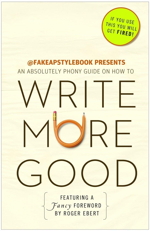Yesterday, a question from a customer who didn’t know what he was getting himself into: “Hey, do you know anything about Swamp Thing?”
No, no, don’t worry, I didn’t lay into him with every single fact about Swamp Thing that I have swirling around my brain — I don’t want to be one of those guys — but I did try to tell him that the current issue is probably not the best place to start with the character, and that he might want to try some older issues first. He didn’t listen to me and bought the current issue anyway, so hopefully he’ll be more intrigued than confused and come back for more. We’ll see.
Another question I occasionally get hit with:
Customer: “So, what’s good?”
Me: “Well, this Acme Novelty Library graphic novel is really good…it’s a darkly-humored examination of loneliness and alienation.”
Customer: “Huh, that’s interesting…say, has Michael Turner done anything lately? We draws some fantastic babes.”
The problem is that my definition of “good” and the customer’s definition are usually at odds with each other…this example is just a slight exaggeration, but when given not much to work with beyond “I’m looking for something good,” it can be a minor struggle to find something appropriate. Now, I’ve been at this for a long time…once I get an idea of the kind of thing the customer’s looking for, even if it’s something I don’t much care for myself, even if it’s the worst comic book ever, I can generally find something to the customer’s taste.
Of course, sometimes what the customer is asking for is entirely different from what they apparently want. I had a woman ask me for a female superhero comic, one that wasn’t “oversexualized” or “exploitive.” I immediately thought of Go Girl, by Trina Robbins and Anne Timmons…a perfectly innocent and charming comic written by one of the industry’s most prominent feminist cartoonists…nope, apparently Go Girl’s breasts were too large, and thus was too sexist.
What that customer ended up buying…Dogwitch. Now, don’t get me wrong, I’m not casting aspersions on Dogwitch, but given the book’s mature content, it didn’t seem like the sort of thing she was asking for. Plus, that’s kinda stretching the definition of “superhero” a bit.
And don’t get me started on the Sam Keith “fans,” who “love all his work,” but won’t buy Four Women or The Maxx or Zero Girl, but only want his Wolverine comics.
Requests I don’t get enough of: “I have $900 in my pocket, and I want to spend it on any items in the store that have been sitting around for a while, and you’d be happy to see leave the shelves. What have you got?” “Right this way to the Buffy the Vampire Slayer trade paperbacks, sir!”







